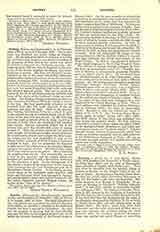

Cotelier (COTELERIUS), JEAN-BAPTISTE, patristic scholar and theologian, b. December, 1629, at Nimes; d. August 19, 1686, at Paris. The early education of this very gifted man was under the personal direction of his father, at one time a minister of the Reformed Church, but later a convert to Catholicity. So rapid was his progress in learning that he could fluently interpret the Bible in the original Hebrew and Greek before the General Assembly of the French clergy at Mantes (1641). On the same occasion he showed his proficiency in mathematics, and made such a favorable impression on the clergy that they increased his father’s pension from 600 to 1000 livres. To this sum 300 livres were added for the purchase of books. During the period of his theological studies at Paris (1641-47), Cotelier’s brilliant intellectual qualities procured for him an introduction to the king (1644). He graduated as bachelor in theology in 1647 at the Sorbonne, of which he became a member in 1648, though he never received priestly ordination. In 1654, he accompanied Archbishop d’Aubusson de la Feuilade of Embrun to his diocese and became his counselor. He returned, in 1659, to Paris and again devoted himself to study. With the philologist Du Cange he was commissioned in 1667 by Minister Colbert to investigate and catalogue the Greek manuscripts of the Royal Library. In 1676 he was appointed professor of the Greek language in the College Royal at Paris.
The editions of ancient writings prepared by Cotelier were, in chronological order: (I) “Homiliae quatuor in Psalmos et interpretatio prophetic Danielis, grace et latine” (Paris, 1661). He attributed these unpublished homilies to St. John Chrysostom; other critics, owing to the diversity of style, hold a different opinion. (2) “SS. Patrum qui temporibus apostolicis floruerunt, Barnabae, Clementis, Hermc, Ignatii, Polycarpi opera edita et non edita, vera et supposita, grace et latine, cum notis” (Paris, 1672). This excellent edition is Cotelier’s principal work. From its title was derived the designation of Apostolic Fathers for the earliest non-inspired Christian writers. Most of the copies of the work were consumed by a conflagration in the College Montaigu at Paris. Two revised editions were published by Leclerc (Clericus), one at Antwerp (1698), the other at Amsterdam (1724). Reprints of this last edition are found in Migne, P.G., I, II, V. (3) “Ecclesia Grata Monumenta, grace et latine” (Paris, 1677, 1681, 1686). The third volume of this series was published two days before the author’s death. He had collected materials for a fourth volume which was edited (1688) by the Maurists, Pouget, Montfaucon, and Lopin, and is sometimes known as “Analecta Graca”. Cotelier also left several volumes of manuscripts, which bear chiefly on Christian antiquity and are still preserved in the Bibliotheque Nationale at Paris. He was an extremely accurate scholar, of a modest and retiring nature and kindly disposition.
N. A. WEBER

